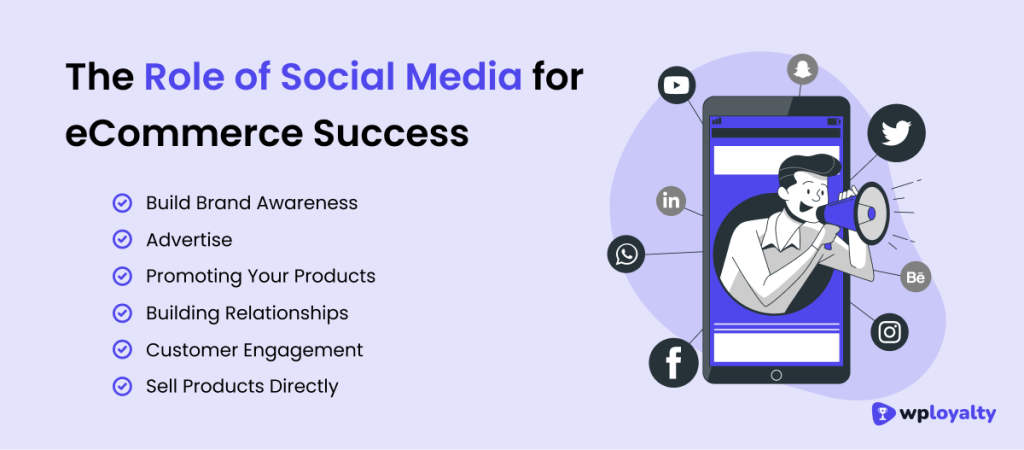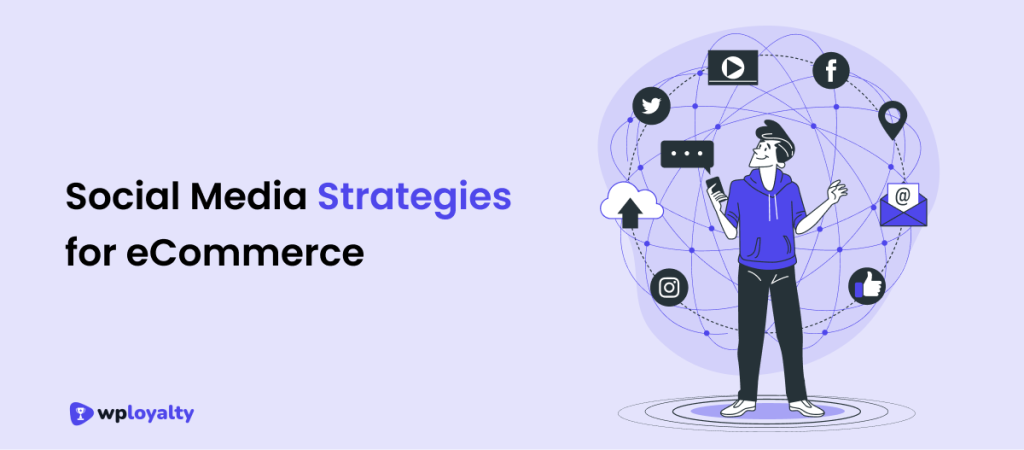Leveraging the power of social media for eCommerce is essential for businesses to engage with customers effectively, drive brand awareness, and boost online sales. We all know social media has become integral to our lives, revolutionizing how we connect, share, and discover. However, beyond its role as a platform for personal connections and entertainment, social media has emerged as a powerful tool for eCommerce.
With its unparalleled reach, influence, and ability to connect businesses with their target audience, social media has transformed eCommerce.
In this blog, we will delve into what social media eCommerce marketing is, the role of social media for eCommerce success, and social media strategies for eCommerce. Let’s dive in!
Allow customers to share your product on social media and reward them for their action using WPLoyalty.
What is Social Media eCommerce Marketing?
Social media eCommerce marketing refers to using social media platforms as a strategic tool to promote and sell products online. It involves leveraging various social media channels like Facebook, Instagram, Twitter, and LinkedIn to connect with target audiences, build brand awareness, engage with customers, and drive conversions.
Through social media for eCommerce, brands can utilize targeted advertising, content creation, or influencer partnerships. It will generate leads and ultimately increase sales through online platforms. One main advantage of using social media is it helps you reach a broad audience and maximize revenue.
The Role of Social Media for eCommerce Success

The role of social media for eCommerce success includes a boost in sales, attracting new customers, increasing customer engagement, and much more. Let’s look into why social media is important in eCommerce:
Build Brand Awareness
Social media has become a powerful tool for businesses to build brand awareness and achieve eCommerce success. With millions of active users, social media offers a vast potential audience to engage with and promote your products or services.
Social media provides a platform to distribute and share engaging content related to your brand. The content helps create a connection with your audience, encourages them to share it with their network, and ultimately expands your brand’s reach.
Social media allows you to showcase your brand’s personality and tell your brand story effectively. Storytelling through social media humanizes your brand, builds emotional connections, and fosters brand loyalty among your followers. However, it’s crucial to develop a well-defined social media strategy, tailor content for each platform, and consistently monitor and analyze performance to optimize results and achieve long-term eCommerce success.
Advertise
Advertising is crucial to promoting your business and effectively reaching your target audience. Have a clear-cut idea before you go into advertising. Do you want to increase brand awareness, drive website traffic, generate leads, or boost sales?
Knowing your target audience is vital for successful advertising. Gathering data on their demographics, interests, behaviors, and preferences is essential. Keep certain things in mind while advertising:
- Keep your message clear
- Concise and tailored to your target audience
- Utilize eye-catching visuals
- Captivating headlines
- Compelling calls-to-action (CTAs)
Promoting your Products
Promoting your products is another essential aspect of generating awareness, attracting customers, and driving sales. Identify what sets your products apart from the competition. Determine the key features, benefits, or qualities that make your products unique, and emphasize them in your promotional efforts.
Craft persuasive and detailed product descriptions that highlight the value and benefits of your products. Clearly explain how your products can solve a problem or fulfill your customers’ needs. Visuals play a crucial role in product promotion. Use high-quality images or videos that showcase your products from different angles and demonstrate their usage.
Create limited-time offers, discounts, or promotions to incentivize customers to purchase. These can include percentage discounts, buy-one-get-one (BOGO) offers, free shipping, or loyalty programs.
Build an email subscriber list and send subscribers regular newsletters or product updates. Include engaging content, special offers, and personalized product recommendations based on their preferences or purchase history. Email marketing is an effective way to nurture relationships with your audience and promote your products directly.
Building Relationships
Indeed, social media platforms provide valuable opportunities to build and strengthen relationships with your customers. You can engage in real-time conversations, respond to inquiries, address concerns, and provide timely support. By being accessible and responsive, you can build trust and demonstrate your commitment to customer satisfaction.
Social media provides a window into what customers say about your brand, products, and industry. You can gain valuable insights into customer preferences, opinions, feedback, and more by actively monitoring and listening to social media conversations.
Customer Engagement
The significant role of Social media in customer engagement is to provide a platform for businesses to directly interact with their customers and foster relationships. Customers can easily reach out to businesses with inquiries, feedback, or concerns through comments, direct messages, and mentions. Social media enhances customer engagement by
- Providing direct communication channels
- Active engagement opportunities
- Personalized Targeting
- Content sharing
- Social listening insights
- Influencer collaborations
- Customer Advocacy
- Community building
Sell Products Directly
One of the main advantages of using social media in eCommerce is selling products directly. Utilize the built-in shop features on social media platforms like Facebook, Instagram, or Pinterest. These features enable you to create a dedicated shop section on your social media profile, where customers can browse your products, view descriptions, and make purchases without leaving the platform.
Create a sense of urgency and exclusivity by offering limited-time discounts, flash sales, or promotional codes for your social media followers. Encourage customers to act quickly and take advantage of these special offers, driving immediate sales.
Offer exciting discounts for sharing products on social media using WPLoyalty.
Social Media Strategies for eCommerce

Social media strategies for eCommerce will help you enhance your business and maximize sales. Remember to adapt your approach based on the specific needs of your target audience, stay updated on social media trends, and regularly measure the performance of your strategies to optimize your results.
Here are some effective social media strategies for eCommerce:
Social Listening
Monitor social media conversations related to your brand, industry, or products. Use social listening insights tools to gain insights into customer sentiments, preferences, and trends. This information can help you understand customer needs better, identify opportunities, and address concerns proactively. Engage in relevant discussions to build relationships and show that you value customer opinions.
Build a Video Content Strategy
Incorporate videos into your social media strategies for eCommerce. Videos are highly engaging and can effectively showcase your products, demonstrate their usage, or share compelling stories. Create product tutorials, behind-the-scenes glimpses, customer testimonials, or engaging brand storytelling videos. Optimize videos for each social media platform and encourage sharing to increase visibility.
Share Quality Content
Consistently share high-quality and relevant content that adds value to your audience. This can include informative blog posts, how-to guides, industry insights, or compelling visuals. Establish yourself as an authoritative source of information in your industry and offer valuable tips or advice related to your products. Valuable content builds trust, credibility, and fosters customer engagement.
Interact with Influencers
Collaborate with influencers in your industry or niche to extend your reach and tap into their engaged audience. Influencers can promote your products through sponsored posts, reviews, or endorsements. Their influence and credibility can help generate interest, drive traffic to your eCommerce store, and increase conversions. Build authentic relationships with influencers to ensure a genuine connection with your target audience.
Be Responsive
Maintain an active presence on social media and promptly respond to customer comments, messages, and inquiries. Show that you care about customer engagement by addressing their concerns, answering questions, and providing helpful information. Quick and thoughtful responses demonstrate excellent customer service, build trust, and encourage customer loyalty.
Use WPLoyalty – start building trust and increase customer loyalty right today.
Conclusion
Social media is a game-changer for eCommerce success. It allows businesses to connect with their target audience, build brand awareness, and drive sales like never before. With platforms like Facebook, Instagram, and Twitter, companies can reach millions of potential customers, personalize their marketing efforts, and foster brand loyalty.
By leveraging the power of social media strategically, eCommerce businesses can stay ahead of the competition, create meaningful connections, and achieve long-term success in the digital landscape.
Learn more about How To Improve Customer Retention?, How To Be Successful In ECommerce Business? And The Ultimate Guide To Customer Acquisition.
Frequently Asked Questions
Social media plays a vital role in the success of an e-commerce business by providing a platform for direct customer engagement, brand promotion, and driving website traffic. It enables businesses to reach a wider audience, build brand awareness, showcase products, and leverage user-generated content to influence purchasing decisions.
The effectiveness of social media platforms for driving e-commerce sales depends on the target audience and industry. However, platforms like Facebook, Instagram, Pinterest, and YouTube have consistently shown strong potential for generating sales. These platforms offer various advertising options, audience targeting capabilities, and engaging visual content formats that align well with e-commerce objectives.
Social media advertising is highly important for e-commerce success as it allows businesses to reach a specific target audience, increase brand visibility, and drive qualified traffic to their websites or online stores. With precise targeting options, businesses can optimize their ad campaigns to reach potential customers who are more likely to convert, resulting in increased sales and revenue.
To build customer loyalty and encourage repeat purchases through social media, businesses can focus on creating engaging content, offering exclusive promotions and discounts, providing exceptional customer service, and actively responding to customer feedback. Building a sense of community through user-generated content, contests, and interactive campaigns also fosters a loyal customer base.
To gauge the success of e-commerce efforts on social media, key metrics and analytics to monitor include reach, engagement (likes, comments, shares), click-through rates, conversion rates, website traffic generated from social media, and the number of sales attributed to social media channels. Additionally, tracking customer sentiment, feedback, and brand mentions can provide insights into the overall perception of the brand and its products.
